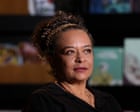
In a historic moment celebrated widely across Brazil and beyond, Ana Maria Gonçalves has become the first Black woman to be elected to the Brazilian Academy of Letters. Founded in 1897 and inspired by France’s Académie Française, this venerable institution has, for much of its history, been a bastion of predominantly white male intellectuals. Now, it opens a new chapter with Gonçalves’ inclusion, highlighting a broader cultural shift towards inclusivity within Brazil’s literary community.
Gonçalves, at 54 years of age, is celebrated not only for her literary accomplishments but also for her role as a trailblazer in breaking racial and gender barriers. She steps into this esteemed circle of intellectuals with a wealth of experience and accolades, most notably for her work “Um defeito de cor” (“A Color Defect”), a landmark novel that has been praised for its exploration of racial identity and history. Her election is being met with joy and admiration by her peers, activists, and public figures, including President Luiz Inácio Lula da Silva, who extended his congratulations alongside a broader acknowledgement of the significance of this achievement for Brazilian society.
Ana Maria Gonçalves’ induction into the Academy represents more than just a personal victory; it serves as a beacon of progress and hope for many within Brazil and internationally. It underscores the ongoing efforts to dismantle historic exclusivity in cultural spaces and embraces a more diverse representation of voices that reflect the rich, multifaceted nature of Brazilian society. The celebration extends into literary circles worldwide as Gonçalves’ work continues to inspire discussions on racial and cultural narratives.
This accomplishment also aligns with a broader pattern of increasing literary engagement observed globally. In related cultural developments, the city of Aveiro is witnessing a resurgence in reading and literary participation. As part of the Festival dos Canais, Aveiro’s municipal libraries have reported record-breaking numbers of visitors. This uptick in library attendance underscores a growing public enthusiasm for literary events, reinforcing the importance of community-centric gatherings in fostering a love for reading and shared cultural experiences.
Such trends point towards an encouraging future where literature serves as a cornerstone of community engagement and cultural expression. Aveiro’s success story reflects a dynamic landscape where libraries are not just repositories of books but vibrant centers of learning and social interaction. As cities like Aveiro enhance their cultural offerings, they provide a model of how public spaces can inspire and enable literary exploration for all ages.
The celebration of Ana Maria Gonçalves’ milestone, alongside the vibrant literary activities in places like Aveiro, illustrates a global momentum towards embracing diversity in literary discourse. As more voices find recognition and platforms to share their stories, literature continues to serve as a powerful medium for empathy, understanding, and cultural exchange.
As the world continues to evolve, so too does the appreciation for the stories that shape our communities and histories. The integration of diverse voices, like that of Ana Maria Gonçalves, coupled with the enthusiasm seen in public literary spaces, calls for a harmonious convergence of past, present, and future narratives in literature. It is a reminder of the unifying power of storytelling and the vital role it plays in bridging divides and nurturing a more inclusive world.
Indeed, as we celebrate these milestones, we are reminded of literature’s potential to inform, comfort, and connect individuals across different backgrounds. It is through these connections that societies can foster dialogues that are not only enriching but also pivotal to progress and understanding in an ever-diverse world. With accomplished figures like Ana Maria Gonçalves leading by example, the future of literary discourse looks bright, dynamic, and inclusive.
Source: {link}
